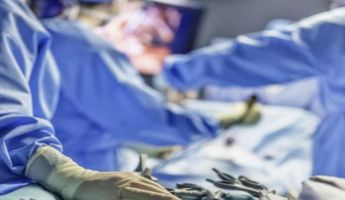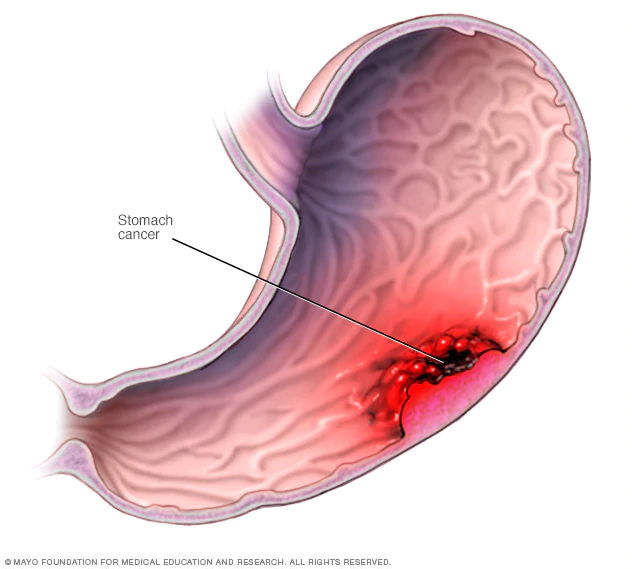Stomach Cancer Treatment in Saudi Arabia
Search and Compare the Best Clinics and Doctors at the Lowest Prices for Stomach Cancer Treatment in Saudi Arabia

Find the best clinics for Stomach Cancer Treatment in Saudi Arabia
No clinics available
Ukraine offers the best prices Worldwide
Price: $ 2,487

- Home
- Saudi Arabia
WHY US?
At Medijump, we're making medical easy. You can search, compare, discuss, and book your medical all in one place. We open the door to the best medical providers worldwide, saving you time and energy along the way, and it's all for FREE, no hidden fees, and no price markups guaranteed. So what are you waiting for?

Free

Best Price

Widest Selection

Risk-Free
What you need to know about Stomach Cancer Treatment in Saudi Arabia

If you have been diagnosed with stomach cancer, your doctor will discuss your treatment options with you. Your treatment options depend on several factors, including your overall health, the stage of your cancer, your age, and your personal preference. Stomach cancer may be treated with surgery, chemotherapy, radiation therapy, targeted therapy, or immunotherapy.
What does a Stomach Cancer Treatment Procedure Involve?
Surgery for stomach cancer is performed to remove all of the stomach cancer and some of the surrounding healthy tissue, your doctor may remove early-stage tumors from the lining of your stomach, remove a portion of your stomach (subtotal gastrectomy), remove your entire stomach (total gastrectomy), and remove lymph nodes to look for cancer. All of these surgeries are performed under general anesthetic. With chemotherapy, a drug is used to kill cancer cells, while with radiation therapy, high-powered energy beams are used to kill cancer. Your doctor may also recommend targeted therapy or immunotherapy, which uses targeted drugs or your own immune system to fight cancer.
How Long Should I Stay in Saudi Arabia for a Stomach Cancer Treatment Procedure?
After surgery, you will need to stay in the hospital for three to eight days and stay in Saudi Arabia for seven to fourteen additional days after you are discharged. If you undergo immunotherapy, chemotherapy, radiation therapy, or targeted therapy, your length of stay depends on how many cycles are needed for your specific case.
What's the Recovery Time for Stomach Cancer Treatment Procedures in Saudi Arabia?
The total recovery time until you can return to your normal routine may take several months, but you should be able to return to work within 4-6 weeks. If you only have therapy, you should be able to return to most of your activities when you do not experience any symptoms that interfere with your ability to perform your duties.
What sort of Aftercare is Required for Stomach Cancer Treatment Procedures in Saudi Arabia?
You need to adjust to a new diet after the surgery so make sure to talk to a dietitian about what to eat. Regular exercise is really important to keep your body healthy, you can start walking as soon as you can. Make sure to schedule follow-up checkups with your doctor to monitor your condition and you may do this with your local doctor at home or your doctor in Saudi Arabia.
What's the Success Rate of Stomach Cancer Treatment Procedures in Saudi Arabia?
Treatment for stomach cancer is known to be effective, but the success rate varies depending on how early the treatment is performed as well as the stage of cancer. The side effects and risks of stomach cancer treatment, which include infection, bleeding, damage to other organs, problems with anesthetic, hair loss, and fatigue.
Are there Alternatives to Stomach Cancer Treatment Procedures in Saudi Arabia?
If you prefer not to undergo treatment or too frail for any type of treatment, you should consult with your doctor and cancer team on the best alternative for you. In some cases, surgery to relieve only the signs and symptoms is recommended.
What Should You Expect Before and After the Procedure
Stomach cancer causes symptoms such as heartburn, nausea, pain, vomiting, and fatigue that may interfere with your daily life. It is also dangerous and it can spread to other organs. After the surgery, you should no longer experience any symptoms and you can return to your normal life.
Whilst the information presented here has been accurately sourced and verified by a medical professional for its accuracy, it is still advised to consult with your doctor before pursuing a medical treatment at one of the listed medical providers
No Time?
Tell us what you're looking for and we'll reachout to the top clinics all at once
Enquire Now

Popular Procedures in Saudi Arabia
Prices Start From $1,314

Prices Start From $512

Recommended Medical Centers in Saudi Arabia for procedures similar to Stomach Cancer Treatment

- Interpreter services
- Translation service
- Religious facilities
- Medical records transfer
- Medical travel insurance
- Health insurance coordination
- TV in the room
- Safe in the room
- Phone in the room
- Private rooms for patients available

- Interpreter services
- Translation service
- Religious facilities
- Medical records transfer
- Medical travel insurance
- Health insurance coordination
- TV in the room
- Safe in the room
- Phone in the room
- Private rooms for patients available

- Interpreter services
- Translation service
- Religious facilities
- Medical records transfer
- Medical travel insurance
- Health insurance coordination
- TV in the room
- Safe in the room
- Phone in the room
- Private rooms for patients available
Stomach Cancer Treatment in and around Saudi Arabia
Introduction
The Kingdom of Saudi Arabia is the birthplace of Islam and is home to the holy Muslim city of Mecca, all Muslims are required to make a pilgrimage to this city at least once during their life and non-Muslims are forbidden from the city. There are other wonders to be found here, from the Red Sand Dunes in Riyadh, Jeddah’s coral architecture, to the azure waters of the Red Sea. In the last few years, the Kingdom has developed a plan to encourage international patients to seek treatment at its medical centers. The healthcare sector in the country has constantly improved and developed and the country has all the attributes to have a successful medical tourism industry, such as ultra-modern hospitals that are well-equipped with cutting-edge technology, foreign-trained doctors and specialists, and a well-established private healthcare sector.
Popular Cities and Regions in Saudi Arabia
The capital city is Riyadh, which is one of the wealthiest cities in the world. It offers amazing attractions for tourists, such as the Masmak Fortress, the National Museum, the Kingdom Center, the Sky Bridge, Riyadh Zoo, and the Antiquities Museum. Another popular city is Jeddah, which is called the Bride of the Red Sea. It’s a large metropolitan city with an incredible waterfront and beautiful old town. It’s the traditional gateway to Mecca, as well as the historic crossroads of traders and pilgrims. Most tourists visit this city to admire its World Heritage Red Sea architecture, explore its lively souq, relax in its laid-back coastline, and try its world-class cuisine.
Transport in Saudi Arabia
King Fahd International Airport is the largest airport in Saudi Arabia, located in the city of Dammam. It serves flights to and from numerous cities in Europe, Asia, and the Middle East. Domestic flights are the best way to travel around this country. Buses, taxis, and car rental are widely available for travel inside the cities.
Visas in Saudi Arabia
Almost all nationalities need to have a visa to visit Saudi Arabia, except for citizens of Bahrain, Kuwait, Oman, and the UAE. eVisa or visa on arrival is available for holders of passports of 51 countries, including all EU countries, the US, the UK, and Japan. Most other countries need to obtain a visa prior to arrival.
Weather in Saudi Arabia
Saudi Arabia has two seasons, summer and winter. Summer (April – October). The weather is extremely hot and humid. The average temperatures range between 40oC to 45oC, but it can soar to 49oC. Winter, from November to March, brings mild temperatures, with an average of 20oC during the day and 10oC during the night.
Additional Info
- Local Currency: Saudi riyal (SAR) is the currency. 1 USD is equivalent to 3.75 SAR.
- Money & Payments: ATMs are widespread and credit cards are widely accepted. There is no tipping culture.
- Local Language: Arabic is the official language, but English is widely spoken.
- Local Culture and Religion: Women do not need to wear abayas (a long black, robe-like dress) anymore, except at religious sites. However, both men and women have to wear modest clothing and refrain from showing too much skin. Islam is the state religion and the country’s law requires all citizens to be Muslim. Any non-Muslims who want to acquire Saudi Arabian nationality will have to convert to Islam. There are Hindus, Christians, and Buddhists in the country but all of them are foreign nationals.
- Public Holidays: The most celebrated public holidays in Saudi Arabia are Eid Al-Fitr, Eid Al-Adha, ad National Day.
Popular Searches
- Plastic Surgery in Thailand
- Dental Implants in Thailand
- Hair Transplant in Thailand
- Breast Augmentation Thailand
- Gastric Sleeve in Thailand
- Gender Reassignment Surgery in Thailand
- Laser Hair Removal in Bangkok
- Botox in Bangkok
- Dermatology in Bangkok
- Breast Augmentation in Bangkok
- Coolsculpting in Bangkok
- Veneers in Turkey
- Hair Transplant in Turkey
- Rhinoplasty in Turkey
- Stem Cell Therapy in Mexico
- Rhinoplasty in Mexico
- Liposuction in Mexico
- Coolsculpting in Tijuana
- Rhinoplasty in Korea
- Scar Removal in Korea
- Gastric Sleeve in Turkey
- Bone Marrow Transplant in India
- Invisalign in Malaysia
- Plastic Surgery in the Dominican Republic
- Tummy Tuck in the Dominican Republic
- Plastic and Cosmetic Surgery in Poland
- Rhinoplasty in Poland
- Hair Implant in Poland
- Dental Implants in Poland
- IVF in Turkey